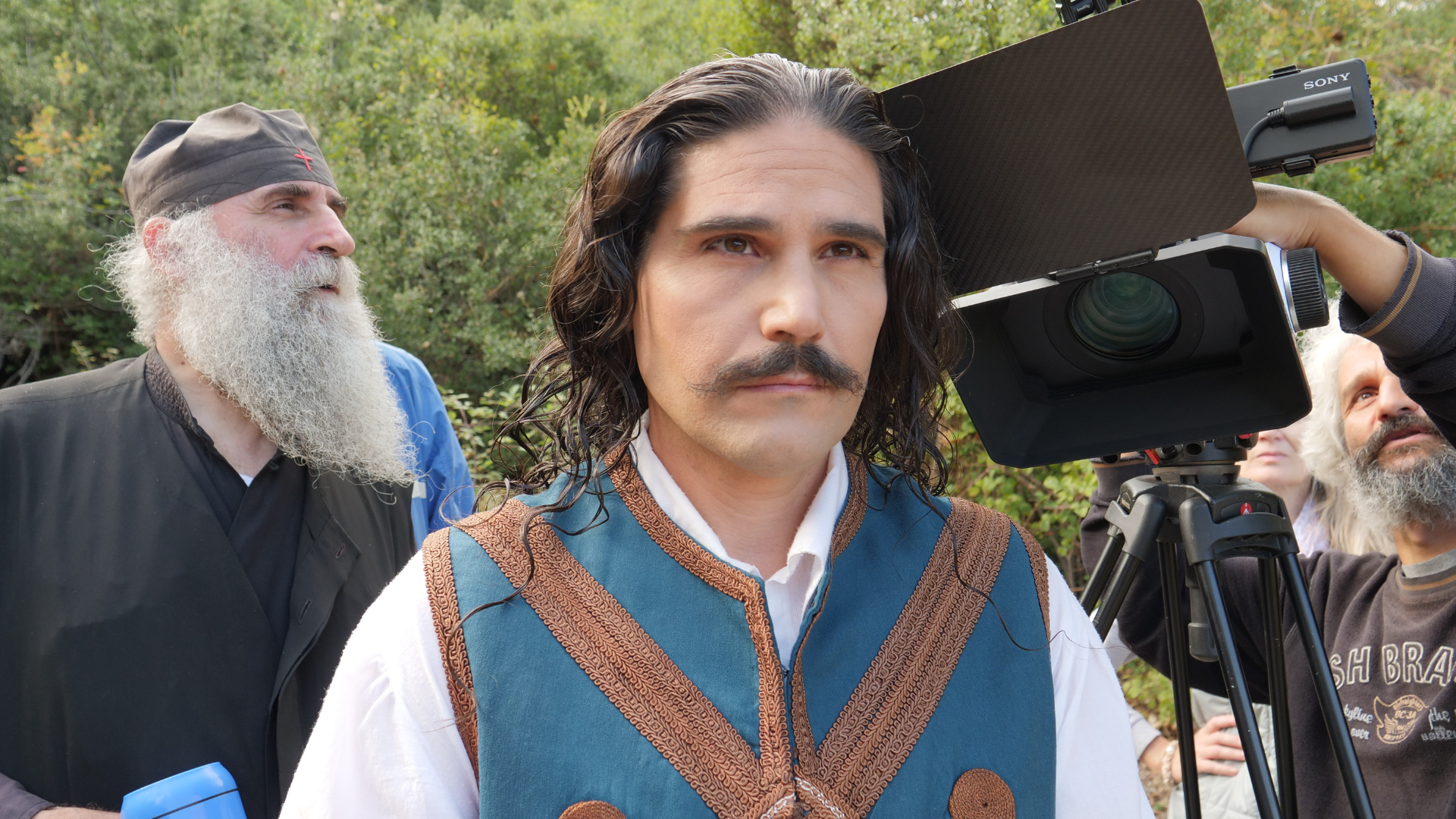By Ilias Karagiannis
A new film ‘Diakos the Heroic Martyr’ brings the story of Athanasios Diakos to life on the big screen, where audiences see his journey from the day of his baptism in the church until his martyrdom on April 24, 1821 in Lamia, Greece.
Diakos was a Greek military leader among the protagonists of the first year of the 1821 Greek Revolution who worked in central Greece. He hailed from the mountainous Phocis region and according to one source, his real name was Athanasios Grammatikos, or according to other sources, Athanasios Massavetas.
He chose ‘Diakos’ as his surname and was initiated into the Friendly Society (Filiki Eteria) in 1818, becoming a charioteer in Livadeia in 1820. In April 1821, in collaboration with other military leaders, he captured the fortress of Livadeia and used it as a base to engage in many victorious battles.
He captured the bridge of Alamana and on April 23, 1821, he fought against the Ottoman troops. In this battle, he was captured and after being transferred to Lamia, he was tortured and murdered by the Ottomans on April 24, 1821.
The film ‘Diakos the Heroic Martyr’ is the new production by Philotimo Film. The organisation is under the auspices of the Spiritual Centre ‘Agios Fotios’ of the Holy Metropolis of Kitrou, Katerini and Platamonos.
Four hundred and fifty volunteers of all ages, from young children to the elderly, participated in the making of the film, each willing to contribute with their own knowledge.
The inspiration behind this endeavour is Father Pavlos Ntouros, the screenwriter and director of the film, who spoke to The Greek Herald about the team’s new effort following a documentary about Jerusalem in 2013 and ‘A Nameless Tale’ in 2014.
“The journey of Philotimo Films (formerly Agios Fotios films) began in March 2013. That’s when the filming of the documentary ‘From Unseen Passions 1’ started. It was written by Graphontos and directed by Kostas Kalpatzidis, and deals with Easter in the Holy Land and was completed in June the same year,” Father Pavlos told The Greek Herald.
“The enthusiastic reception from the people of Pieria encouraged our pioneering cinematographers and they dared to test their strengths in a fictional film, ‘A Nameless Tale.’ This is the first film adaptation of the well-known novel by Penelope Delta, which is a hymn to the common sacrificial effort for the good of the Motherland.
“The implementation of the film itself was achieved with such a spirit of sacrifice and contribution from all its contributors. It also achieved great success in various parts of Greece, where it premiered during 2015 and 2016.
“Four years later – and after the production of ‘From Unseen Passions’, ‘Ascent’, and ‘Churches Mean’ in the meantime – the creation of ‘Diakos the Heroic Martyr’ began, which is the most complete production of ‘Philotimo Films’ to date.
“The choice of the topic was made in the context of the celebration of 200 years since the Greek Revolution of 1821.”
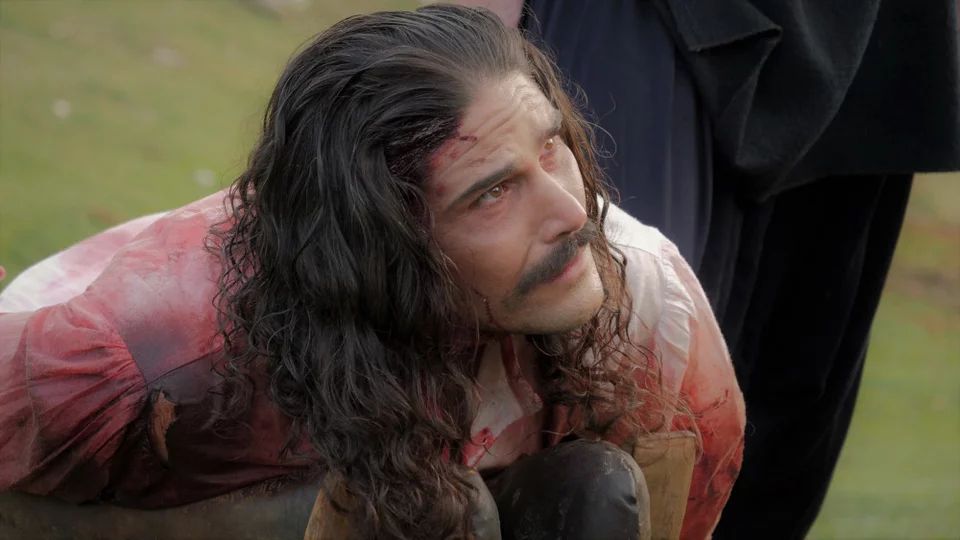
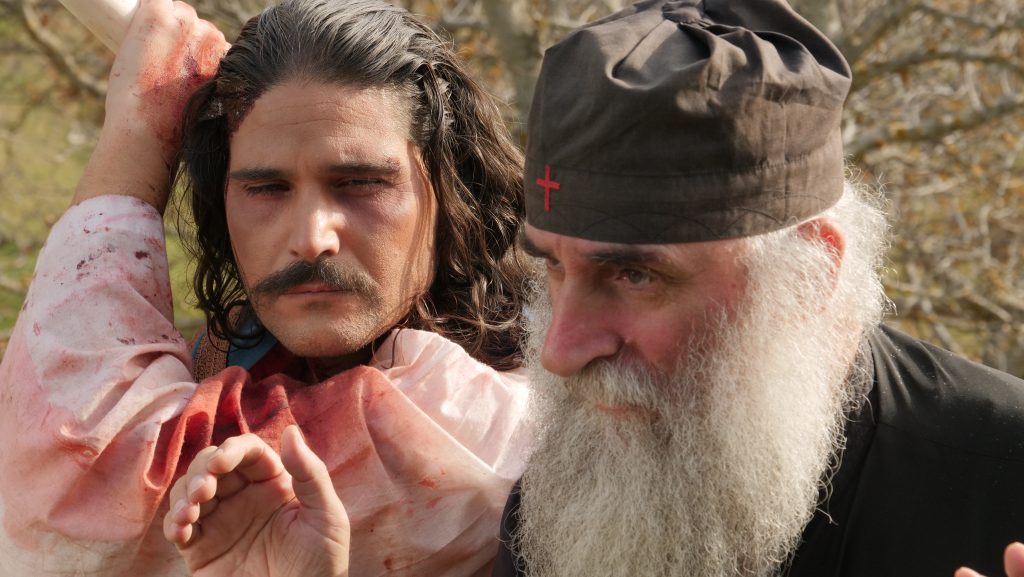
1821 revived in the villages of Pieria
The filming took place across five months in various areas of Pieria. From Agios Vasileios Karitsas, to Dion, Palia Vrontou, and Mount Olympus, but also in surrounding places, such as Kokkinopilos in Elassona, Larissa, and Siatista in Kozani, the picturesque town with strong elements of traditional architecture.
While filming, besides the hundreds of members and friends of the Spiritual Centre ‘Agios Fotios’ from Pieria, Giannitsa, Thessaloniki, and elsewhere – most of whom were amateur actors, key roles such as cinematographer, director of photography, and sound recorder were assigned to professionals, who assisted in the effort.
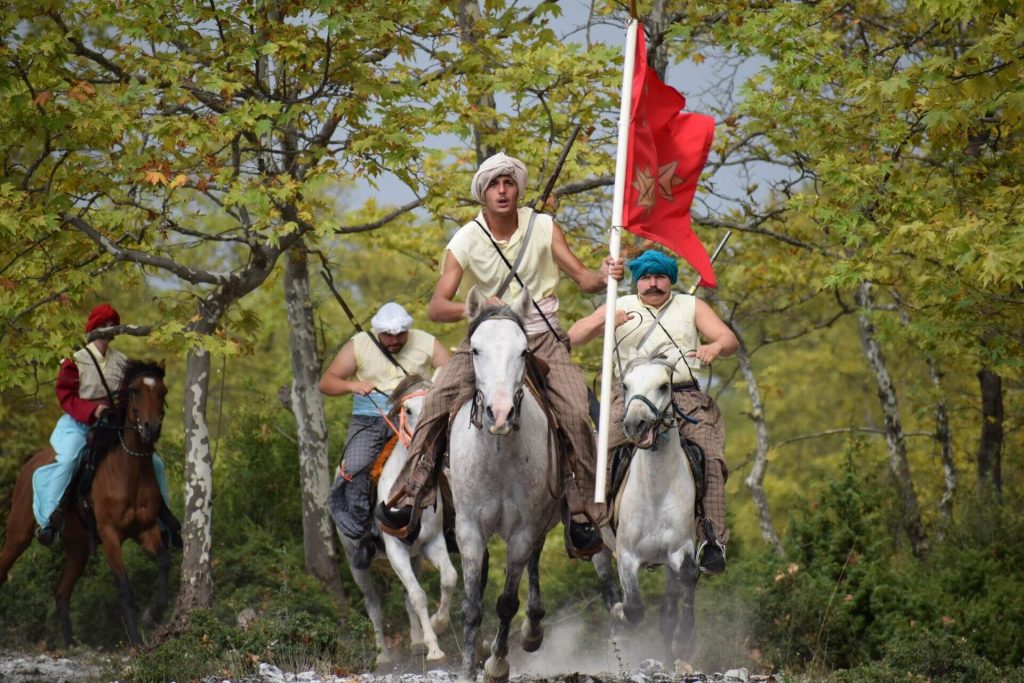
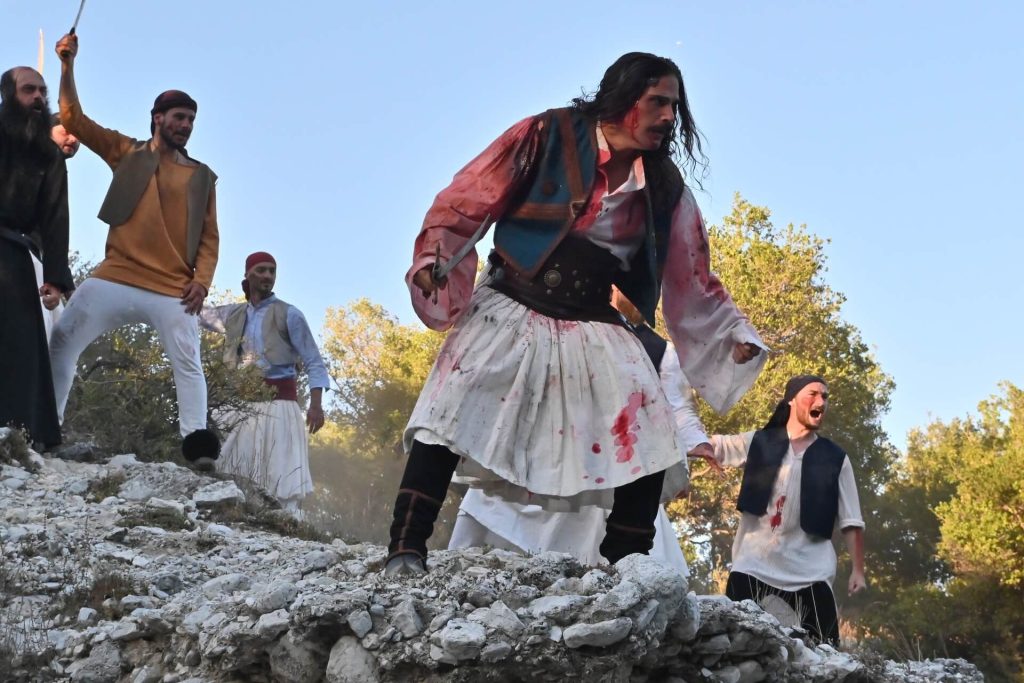
We asked Father Pavlos how Diakos was chosen as the hero of the film and he answered, urging us to discover the deeper meaning behind it.
“In the long history of Hellenism, heroism, courage and virtue shaped the souls of citizens, which is, the essence of civilisation. Today, unfortunately, there is a crisis of values and therefore a deep cultural crisis. Nevertheless, there are many of our compatriots who are inspired by the lightning-like, lion-hearted spirits of the fighters of 1821. Their hearts become fiery, fearsome, invincible, and… only they can ‘grasp’ the deepest meaning of Diakos,” he said.
The result of the film looked highly professional, so we asked Father Pavlos to tell us about the challenges they faced while filming.
“‘Philotimo films’ is one of the activities of the Spiritual Centre ‘Agios Fotios’ of the Holy Metropolis of Kitrou, Katerini and Platamonos and constitutes a Ministry that is voluntary and selfless. With the blessing of His Eminence Metropolitan Georgios, a framework of creation is set up,” the priest answers.
“Of course, we do not idealise everything; all the pathologies of human congregations exist here, of course, but in general, we have a common “vision” and we all strive with all our might to make it a reality.
“Two major difficulties of the project were: first, due to the nature of the film, having a large number of participants and then finding, training, coordinating their schedules, dressing them, moving them, and feeding them, etc, and second, our inexperience. Both obstacles were overcome with the heroic contribution of collaborators including the key contributors, the actors, the extras, the technicians, the donors and sponsors – but also with the wishes and prayers of many friends who were very concerned about the effort.
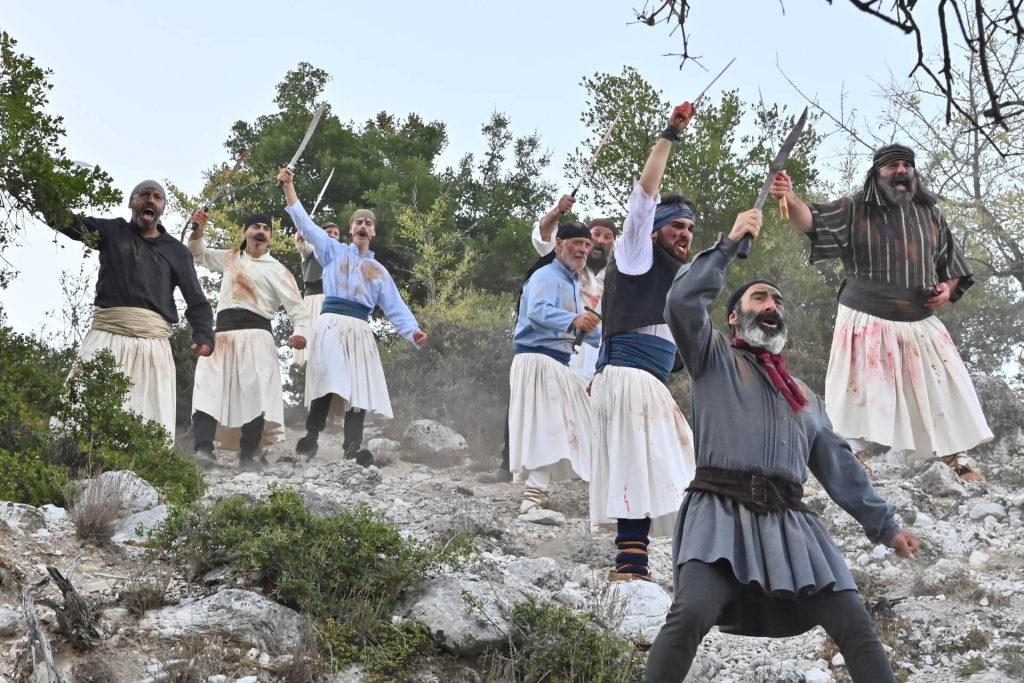
“The actors who met the demands of the film in a professional manner impressed us. The ‘pool’ of actors and collaborators came from the members and friends of ‘Agios Fotios.’ From them, but also from many new faces who pleasantly surprised us with their willingness to participate, the Casting Committee chose the actors of ‘Diakos.’ They interpreted their roles impressively.
“The direction of the film was significantly contributed to by the knowledge and experience of some professionals, but also by the care of all members of the directing team… And of course, there was also the extremely professional post-production!”
The sold-out screenings
The movie was screened many times at sold-out events, with some aimed at students.
“The message of the film is as timely as ever because unfortunately, to a large extent in our days, we live in a decline of love for the homeland and love for the nation. We, in our own way and with this cinematic effort, wanted to highlight and promote this element with the aim of conveying it to everyone, young and old,” Father Pavlos said.
“Greece has always been the bulwark of freedom. Let us mentally refer to the renowned Antiquity, the thousand-year Roman Empire, and the much-suffering Ottoman rule; in all phases of Greece’s history, despite the small or large shocks, the slogan was one and the same; FREEDOM OR DEATH!”
Father Pavlos also informed us about the reception the film received.
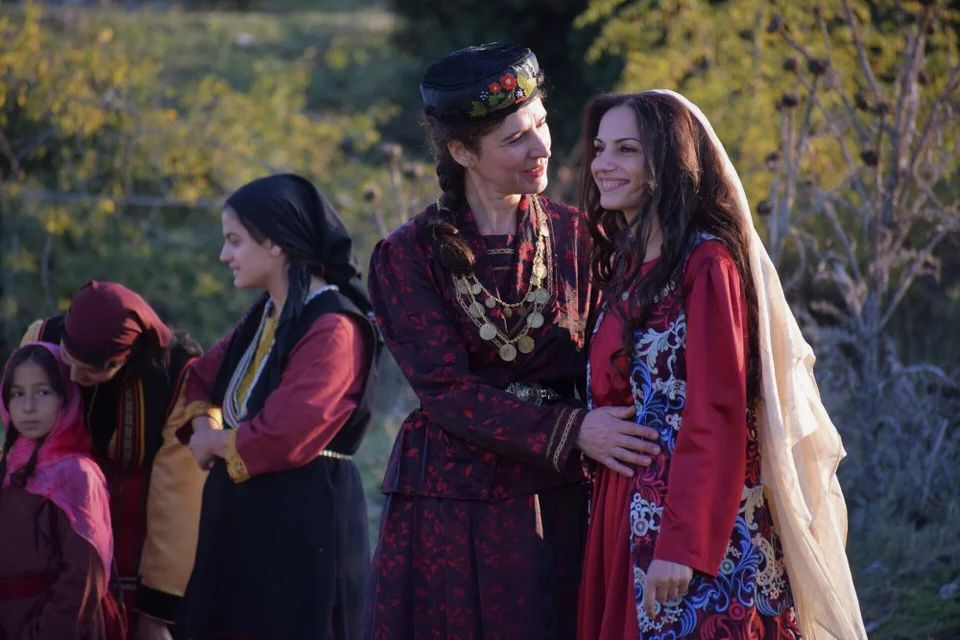
“Very warm! In many places in Greece and abroad – although we expected a greater response from the Greek American community – the enthusiasm and emotion… is indeed remarkable! In the screenings in Katerini, UKARPIDIS Cinema sold out, in Athens a ‘queue’ of viewers, in school screenings the young viewers are captivated!
“A truly moving scene unfolded in one of the screenings; a disabled – retired General – desperately wanted to see the movie, which was being shown in a venue that was not easily accessible for him. His evident desire to watch the film moved the viewers, who mobilised to lift him to the screening area! In the end, he thanked them with many tears in his eyes.
The expatriate community in Australia, due to the fact that it is far from the homeland, lives more intensely for anniversaries like March 25th and anything Greek. The film about Diakos will be a pleasant surprise.

